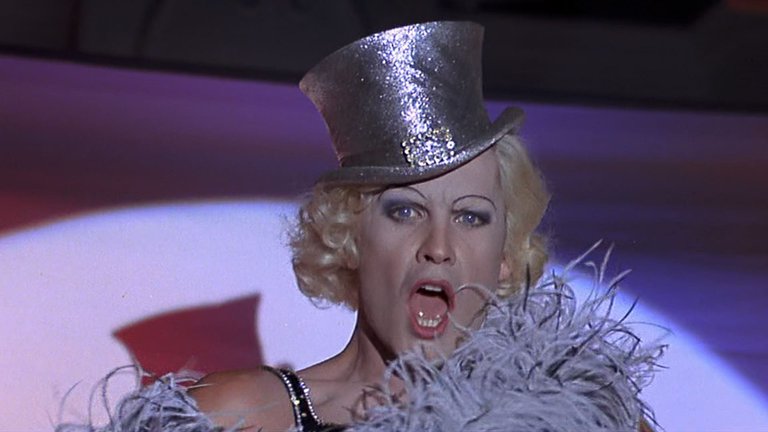Film Review: The Damned (Götterdämmerung, 1969)

Some of the most notorious genres of exploitation cinema that emerged in the 1970s were significantly influenced by serious and critically acclaimed mainstream films crafted by celebrated filmmakers. Among these genres, Nazisploitation stands out as a particularly provocative example, with its roots tracing back to films like The Damned (1969), directed by the Italian auteur Luchino Visconti.
The Damned, originally titled Götterdämmerung—which translates to "Twilight of the Gods"—serves as a symbolic reference to the decline of the European upper classes during the interwar period. This decline is intricately linked to the rise of fascism, a subject Visconti, who belonged to this aristocratic milieu himself, explores with both depth and nuance. It paints a vivid picture of how the elite, in their desperation to maintain power and privilege, become complicit in the very ideologies that threaten their existence.
The film revolves around the Essenbeck family, a fictional dynasty of powerful German industrialists, loosely based on the historical Krupp family, known for their steel production and armament supplies during various conflicts. Th plot begins in 1933, shortly after the Nazis seized power, when we are introduced to Baron Joachim von Essenbeck (played by Albrecht Schoenhals), an elderly aristocrat who harbours disdain for the Nazis yet understands that aligning with them is essential for preserving his family's wealth. The baron decides to replace Herbert Thalmann (played by Umberto Orsini), an openly anti-Nazi executive, with his nephew Konstantin von Essenbeck (Rheinhard Kolldehoff), a high-ranking member of the Nazi SA paramilitaries. Konstantin's position is precarious due to internal strife within the Nazi Party and family intrigues; this tension is exacerbated by Friedrich Bruckmann (played by Dirk Bogarde), an ambitious executive entangled in an affair with Sophie (played by Ingrid Thulin), Joachim's widowed daughter-in-law. The family, which also includes Sophie’s perverted son Martin (played by Helmut Berger), spirals into chaos as Friedrich murders Joachim and frames Herbert for his death, leading to Herbert's forced exile. The climax unfolds during the infamous Night of the Long Knives purge, where personal vendettas intertwine with political machinations.
The Damned is notorious for being one of the first X-rated films to be broadcast on US television, a distinction attributed to the MPAA ratings system established shortly before its release. At that time, X-rating was not solely associated with pornography but encompassed films containing adult themes. While The Damned does not overtly depict graphic sexuality, it explores controversial subjects such as paedophilia, incest, and homosexuality, which stirred significant controversy upon its release. The film faced heavy censorship; its broadcast was truncated, with unedited versions only becoming widely accessible decades later through DVD releases.
One of the most contentious aspects of The Damned lies in its exploration of fascism's connection to sexual perversion—a theme that would resonate throughout 1970s European cinema. This motif can be seen in other works like Bernardo Bertolucci’s 1900, which similarly examines Italy's tumultuous history through a sexual lens. Modern audiences may find The Damned politically incorrect or unacceptable due to its implications linking Nazism with homosexuality; scenes depicting SA members engaged in homosexual orgies prior to their brutal purge contribute to this perception.
The performances throughout The Damned are commendable; Dirk Bogarde excels as Friedrich Bruckmann, embodying a Machiavellian schemer ultimately outplayed by his own ambitions. Helmut Griem stands out as Wolf von Aschenbach, ambitious SS officer, showcasing a calculating intelligence that marks him as the film’s most formidable villain. Conversely, Ingrid Thulin's portrayal of Martin’s dysfunctional mother leans towards overacting at times, detracting from her character's impact. Charlotte Rampling’s role as Herbert’s wife is visually striking yet largely forgettable due to inadequate development within the script; her character, one of the few audience can root for, exits too early from the narrative for audiences to form a strong connection.
Visconti's direction is competent but marked by a cold stylistic approach that contributes to pacing issues; at two-and-a-half hours long, The Damned occasionally feels overextended. The attempt to weave personal dramas with broader historical contexts and crime subplots does not always succeed cohesively. Moreover, the film suffers from an almost complete absence of sympathetic characters; nearly all individuals engage in despicable behaviour. However, this lack may be justified given that it addresses one of history’s darkest chapters.
Despite its flaws—such as pacing issues and morally ambiguous characters—The Damned remains an intriguing and influential work worthy of analysis as an unconventional interpretation of history. Its significance was recognised early on within cinematic discourse; notably, Berger and Thulin would reunite seven years later in Salon Kitty, which has since become one of the most recognised examples of Nazisploitation cinema.
RATING: 6/10 (++)
Blog in Croatian https://draxblog.com
Blog in English https://draxreview.wordpress.com/
InLeo blog https://inleo.io/@drax.leo
Hiveonboard: https://hiveonboard.com?ref=drax
InLeo: https://inleo.io/signup?referral=drax.leo
Rising Star game: https://www.risingstargame.com?referrer=drax
1Inch: https://1inch.exchange/#/r/0x83823d8CCB74F828148258BB4457642124b1328e
BTC donations: 1EWxiMiP6iiG9rger3NuUSd6HByaxQWafG
ETH donations: 0xB305F144323b99e6f8b1d66f5D7DE78B498C32A7
BCH donations: qpvxw0jax79lhmvlgcldkzpqanf03r9cjv8y6gtmk9
Posted Using InLeo Alpha